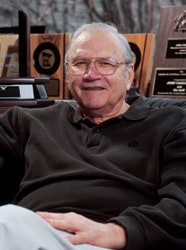
Where did the catchphrase come from?
I was asked to talk at a coaches' convention after we won our first national championship in 1963, and they had heard about some of the radical things we do. I put a few of those things on a list, and it seemed to be very popular. Not so much with the coaches - a lot of them, to this day, don't believe it. But recruits seem to like it. So we just kept it up and added to it. Heck, it could be a longer list. We dare to be different.
Why don't you consider it essential to practice tackling?
It's not as if we are teaching high school guys. The kind of player we get has already made a lot of great tackles. You can be the best tackler in the world, but if you're hurt, you can't play. So first of all, we're preventing injuries. Secondly, you can't make the tackle if you can't get to the ball carrier. If you get there, we assume you're going to be able to tackle. So all we do in practice is defeat the offensive blocking scheme. That's not as stupid as it sounds.
Your 90-minute practices are also popular, as roughly one out of every 10 men who attend St. John's plays for you. How do you manage?
We try to hold the roster to the number of lockers we have — 190. We could have far more players than that. Many will never play a down, but they really enjoy being part of a team. They're getting something out of it.
How tempting has it been to test your methods at a higher level?
I've had some very good offers, but nothing in Division I. I like it here. You still have to win, because if you don't, they'll immediately say that the game has passed you by.
Any advice for young coaches in search of win number one?
When we won that 450th, someone asked me, "Is this the most satisfying win?" I said, "No. Number one was the most satisfying." You have to win number one, number six and number 57 to get here. They're all glorious. Treat every single one as a monumental triumph.





































